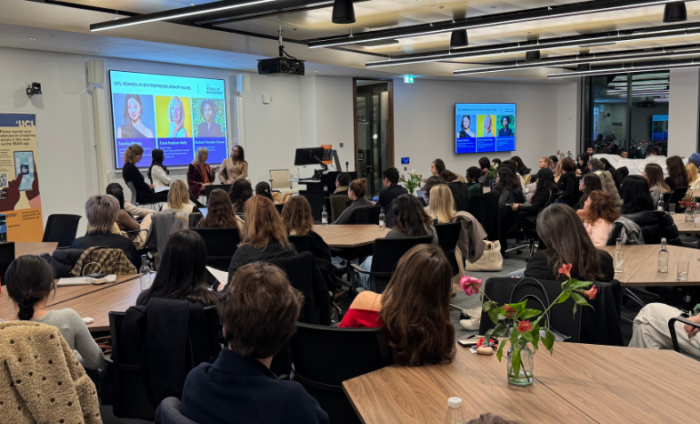
In celebration of Women in Entrepreneurship Day on Wednesday 19 November, UCL School of Management hosted the ElevateHer panel discussion, moderated by MSc Entrepreneurship alumna, Tessa Beishuizen (2024 - 25). The event brought together three accomplished founders and investors who shared practical tools and honest reflections to inspire and equip the next generation of entrepreneurs. The panel featured:
-
Rachael Twumasi-Corson: Founder of Ayaa Botanicals and Afrocenchix (successful exit), Vice-Chair of British Mensa, and UCL alumna;
-
Fiona Hudson-Kelly: Angel investor and Founder of Silver Linings Solutions Limited (successful exit);
-
Sayaka Wakita: Senior Capital Growth & Investments Manager at Unrest, former principal ballerina, and Harvard alumna.
Together, they offered diverse perspectives on building ventures, navigating bias, and leveraging personal experiences as strategic advantages. The conversation was rich with insights that resonate far beyond gender, underscoring what every founder can learn from women entrepreneurs.
Tessa Beishuizen, who moderated the discussion, reflected on the impact of the evening: “What made this panel so impactful was the honesty and practicality of the stories shared. These women didn’t just talk about success - they showed what it really takes to build something meaningful, especially when the path isn’t straightforward. I left inspired by their clarity, courage, and commitment to doing things their own way. That’s a message every aspiring founder needs to hear”.
The event reinforced the School’s commitment to entrepreneurship education that combines academic rigour with real-world relevance. It also broadened the conversation about what success looks like and how it can be defined on one’s own terms. Pierre-Jean (PJ) Hanard, School Lead for Entrepreneurship at UCL School of Management, commented: “This panel reminded us that the entrepreneurship journey is rarely linear. The experiences shared reveal important lessons for all founders: turning disadvantage into differentiation, taking ownership of your narrative, and building success with integrity in systems that are not always fair or inclusive”.
Full panel takeaways below: